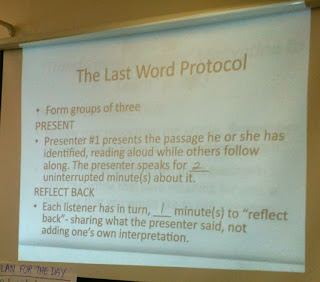Reflections and
Connections
What are implications for the
culture and character of math talk in your classroom/ school/ district?
Classroom: I am
so excited about the math talk and about developing culture in my room. I love teaching the children how to use
their brains and how to think about thinking! (metacognition) From my many years of teaching KG I
know how much they are capable of and I like seeing it in their eyes, posture,
voices, and reactions to each other.
I think too often the KG students are coddled too much. They are capable of high expectations.
Since I started teaching first grade last year I am even
more aware of it. The first month
or so of First grade is teaching that independent thinking and how to have not
only mathematical discourse but also social discourse. It helps distinguish the difference
between “I am the teacher and not your mommy.” Therefore you need too not only learn how to tie your shoes but
use your “I” statements to talk to your peers about what is going on socially,
and explain why you think the way you do about something and why. (Justify)
These are such valuable life skills and we do a disservice
to our students if we don’t set those high expectations and explain to parents
about how their children are capable of it even though they are just 6 years
old.
I am thrilled when it all comes together in the
classroom. When everybody is
participating and really talking to each other (math reasoning as the
authority) you can see the brain grow!
It becomes the normal routine to critique and debate statements made in
plenary, small group or pair discussions.
I especially love the feeling of safety in the room because everyone is
participating. I can’t wait to
work on status and assign competence to low status students.
I thick implementing more structure through how students
pair up and employing the “huddle” will exponentially increase the
discourse. Students pay more
attention to the math when they are given opportunities to talk about the math.
The layers of schema now established from my 2 years in math
studio has me making more connections to habits of mind and habits of
interaction. I am also thrilled
about having 1 year of first grade curriculum under my belt. It should be easier! I also keep in mind that it will take
4-5 years to really establish a strong math culture in my room.
I anticipate meeting with my grades level team to lesson
plan with Bridges and find multiple entries into math. I just hope that everything required of
us by the district does not cut into what I need to do to grow in teaching
mathematics. I hate being forced
to do a quick down and dirty lesson because there is not enough time in the day
to do what is required of me. I
hope we have time to plan and plan together. This will help us in our math talk with each other and the
culture between fellow teachers.
School/District
My biggest concern is the teachers that do the “Lone Ranger”
scene. The ones with a fixed
mindset and feel their way of teaching is better than what the district has
mandated for math curriculum and the culture of math studio. Students coming in from a classroom in the
school or district that have not used Bridges or math studio put a huge burden
on the other teachers. We have to
spend so much time teaching a vocabulary and the Habits of Mind and Habits of
Instruction. They don’t know how
to participate and it slows the other students down when we have to wait for
the other students to catch up with us.
Usually because they don’t know or understand what we are doing in our
math talks it leads to boredom and management problems. It is frustrating to ALL involved!
All that would be solved if teachers would put on the growth
mindset hat and do what the research says works- not what they think
works.


No comments:
Post a Comment